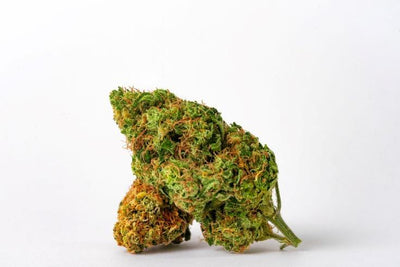Chamomile Benefits and How It Combines with Cannabis for Better Sleep
Chamomile, a name for various daisy-like plants in the Asteraceae family, offers a world of benefits to its consumers. Known for its soothing properties, chamomile contains a plethora of terpenoids and flavonoids capable of delivering a number of natural healing properties.
Consumed by millions each day across the globe, chamomile tea and various other forms of consumption are celebrated for a range of therapeutic effects spanning sleep to anti-inflammation to a world of diverse possibilities [1].
While generally safe, people should take a few precautions before consuming chamomile. Read on to learn more about the benefits of this plant and how it may affect you in the short and long term.
What is Chamomile?
For centuries, people across the world have turned to chamomile as a remedy for various symptoms and ailments. The 3-foot herb with small white and yellow features was prominently used in ancient civilizations across Rome, Greece, and Egypt, where dried chamomile flowers were critical components to teas and essential oils [2] [3].
Today, two primary types of chamomile are utilized worldwide: German chamomile (Matricaria chamomilla) and Roman or English chamomile (Chamaemelum nobile). Both types are regarded for their relaxing and soothing qualities, often linked to improved sleep quality and reduced anxiety. These properties make chamomile a go-to option for countless people seeking improved sleep and other types of relief.
While it is the most utilized form of chamomile, many other consumption types exist. Essential oil has helped expand these options, which we will discuss in a section below.
Chamomile and cannabis share a rather significant overlap, with the two plants often aiding in delivering a relaxing experience to its consumers. The terpene bisabolol is found in both chamomile and cannabis plants.
Not only does its presence exemplify the shared compound connection of the two plants. It also promotes the Entourage Effect theory which suggests that cannabis compounds produce the most ideal effects when a plant's compounds are consumed together, delivering a synergistic beneficial effect to the consumer [4].
Chamomile Benefits
Some may joke that chamomile is strictly for the elderly or elderly at heart. But that couldn't be further from reality. Known for its numerous benefits, this versatile herb has been relied upon for centuries to enhance short- and long-term health and wellness.
The various advantages of chamomile include [5] [6] [7]:
Sleep Enhancement and Sedation
Chamomile is often regarded for its sleep-inducing effects, which are attributed to the flavonoid apigenin. Many turn to a cup of chamomile tea before bed to help them sleep, which also helped inspire the creation of Snoozy sleep edibles and our microdose option.
Anti-inflammatory and Antiphlogistic Properties
The compounds alpha-bisabolol and chamazulene play a critical role in reducing inflammation. These effects have led consumers with rheumatoid pain, muscle spasms, and other inflammation-related pains to use chamomile in a variety of consumption methods.
Anticancer Activity
Apigenin has demonstrated the potential to inhibit cancer cell growth, leading some to suggest that chamomile could potentially aid in cancer prevention and support overall health.
Digestive Health
Chamomile can help alleviate discomfort and maintain healthy digestive function. Its digestive benefits include spasmolytic (spasm relief) and soothing properties, leading many to use the plant to treat gastrointestinal pains like gas, indigestion, diarrhea, and colic.
Skin Health
Chamomile has shown the ability to improve conditions such as eczema and assist in wound healing when applied topically. Anti-inflammatory and antimicrobial benefits have also been reported when used topically, helping soothe skin, minimize irritation, and expedite healing.
Anxiety and Stress Reduction
Chamomile’s anxiolytic (anxiety relief) activity may help people experiencing mild to moderate symptoms, promoting improved stress management and overall mental health.
Respiratory Health
Anecdotal evidence suggests that chamomile is effective in relieving respiratory symptoms, such as common colds and sore throats. These effects may stem from chamomile’s anti-inflammatory properties, but more research is needed before a conclusion can be made.
Women’s Health
Chamomile has been linked to various beneficial effects on women, including aiding in vaginitis (vaginal inflammation), stimulating pelvic area blood flow, and acting as a uterine tonic.
Immune System Support
Chamomile has been linked to improvements in the immune system, helping the body fight off infections, colds, and respiratory infections and improving overall health and wellness.
Hemorrhoid Relief
Chamomile topicals and tinctures applied to the affected areas have been reported to reduce pain, inflammation, and general discomfort, offering patients a non-medical option.
Cardiovascular Health
Regular consumption of chamomile could have positive effects on heart health. The flavonoids present in chamomile have been reported to lower the risk of coronary heart disease and support overall cardiovascular function.
Diabetes Management
Through its ability to lower blood sugar levels, Chamomile has been reported to serve as a protectant against diabetes complications.
Quality-of-Life in Special Populations
Chamomile's comprehensive health benefits make it a potential option for improving one’s quality of life. This improvement has been reported in various communities worldwide, spanning medical patients to the elderly to women of just about every age. Chamomile has demonstrated many beneficial abilities through teas, edibles, topicals, aromatherapy, and more.
Risks of Chamomile
Chamomile is generally considered safe for consumption. However, consumers should always be aware of potential risks and drawbacks to any substance. Those with particular medical conditions and specific health regimens should be aware of all the effects chamomile has been known to produce.
While the benefits of chamomile outweigh most of the risks, consumers need to be aware of the following drawbacks to avoid any potential short or long-term adverse reactions [8] [9]:
Allergic Reactions
People with sensitivities to the Asteraceae/Compositae family of flowers may experience reactions such as skin rashes, coughing, asthma, and various other unwelcome outcomes.
Contact Dermatitis
Dermatitis, a form of skin irritation, may form from direct contact with chamomile flowers or derived products.
Eye Inflammation
While often associated with inflammation and pain relief, using chamomile on the eyes has been reported to exacerbate symptoms.
Cross-reactivity and Contamination Risks
While cannabis and chamomile often amplify sedation effects, the plant may have adverse interactions with other medications and substances, though the risk appears low.
Pregnancy Considerations
Expecting parents should moderate their consumption while pregnant, with concerns over uterine contractions reported.
Digestive Discomfort
Often a stomach and GI symptom reliever, high doses of chamomile may induce nausea and vomiting.
Sedative Interactions
Like cannabis, certain medications, including diazepam, could increase sedative effects.
While chamomile’s benefits often outweigh the drawbacks, consumers must be aware of what they put into their bodies, chamomile or otherwise. Consumers are urged to use caution and monitor their dosage. Like cannabis, consider starting at a lower dosage and building up your chamomile intake to determine which level is ideal for you.
Chamomile Dosing and Consumption Options
Millions worldwide enjoy chamomile every day. Not only is it an often beneficial substance, but it also tastes great in teas and edibles. In addition to eating and drinking, chamomile can also be consumed orally as skin-level topicals.
Individuals have little to no worries over severe or deadly outcomes from overconsuming chamomile. However, several unwanted short-term effects make dosing accuracy that much more important. When consuming chamomile in its various forms, consider the following dosage guidelines as a starting point that you can modify to your personal needs and preferences [10] [11] [[12]]:
Chamomile Tea
Dosages vary by product sold, but every bag contains 250 to 1500 milligrams or more of chamomile leaves. Be sure to check the package before consuming. Consider starting on a lower dosage if you’re using chamomile for the first time or are a beginner.
Chamomile Capsules
Like teas, pill dosages can vary greatly. Usually, capsules contain 250-1,100 milligrams of chamomile per pill. Starting with a lower dose option is wise for newcomers and anyone exploring their ideal dose.
Chamomile Oil
Oils are typically applied to the skin or in an aromatherapy setting, minimizing dosage concerns. Still, consumers should ensure the oil has been appropriately formulated. Only consume options that have been adequately diluted with a carrier oil to help reduce risks of skin irritation. If using a patch, consider starting with a small dosage and building up to find the adequate amount.
Discover the Power of Chamomile and Cannabis
Chamomile has been used as a natural remedy for thousands of years and will likely continue to do so for a long time. People interested in trying chamomile to improve their sleep or experience other therapeutic benefits should consult with a medical professional to understand how the plant May interact with their body and specific needs.
If you decide that chamomile is suitable for you and your sleep needs, consider enhancing the effects with a dose of hemp-derived cannabis from Snoozy. Our bedtime edibles help many consumers fall asleep thanks to the combination of Delta 9 THC, CBD, CBN, chamomile, and l-theanine.
Not only are they effective. They also taste delicious. Find out for yourself today.










